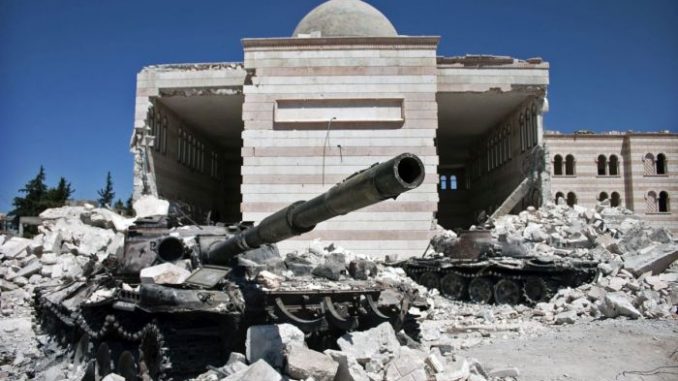
The country we used to know as Syria is no more.
The war has fragmented the country into different entities.
The decentralization of Syria with or without President Bashar al-Assad is already under way, according to international experts.

BYPASS THE CENSORS
Sign up to get unfiltered news delivered straight to your inbox.
You can unsubscribe any time. By subscribing you agree to our Terms of Use
Latest Video
A configuration of international and regional forces will determine Syria’s future in the post-war era.
Sputnik reports:
In an interview with the Russian news website Gazeta.ru, a group of international experts from the Valdai discussion club shared opinions on the current situation in Syria and the future of the war-ravaged country.
“The process of decentralization in Syria is already underway. Even if [Syrian President Bashar] Assad wins the war the country will never return to its pre-war state,” Leonid Isayev, specialist in Arab studies at the Moscow-based Higher School of Economics, said.
“The country we used to know is no more. It will never be restored. The consensus within Syrian society has been ruined. We should understand that even if Assad stays in power for another several years he won’t be as legitimate as before,” noted Mustapha Tlili, director of the Center for Dialogues: Islamic World-US-The West based at New York University.
Currently, the area controlled by the government forces has a number of enclaves, small areas that are not-controlled by the Syrian Army. The army does not have enough resources and personnel to take control over those areas. In addition, Kurds living in northern Syria are unlikely to be part of a centralized state.
“The question is whether Syria will be a federation or confederation in the future. Another option is that the country would be divided into several independent states. Syrian politician Qadri Jamil proposed that Syria was a Unitarian state, with some autonomous regions, like Catalonia in Spain,” Isayev pointed out.
At the same time, Iranian political analyst Mohammad Marandi underscored that only the Syrian people should decide the future of its country. He warned that the collapse of the country would only contribute to the spread of extremism.
Analyst and former Israeli ambassador to Russia Zvi Magen agreed that Syria is unlikely to restore its previous borders after the war.
“It is probable that the western part of the country will be an independent entity – a state or an enclave. Other regions turn into small states, enclaves and other entities, maybe parts of a federation or a confederation. But they are unlikely to become parts of Iran or Turkey,” Magen said.
The analysts also noted that the Syrian conflict involved a number of different forces which sometimes have different goals.
“There are two wars underway in Syria now. The western part of the country is torn by a civil war. This region is mostly controlled by government forces. In eastern Syria, an international coalition is fighting Daesh,” Magen explained.
Isaeyv added that the conflict also involves Turkey, Iran, Saudi Arabia and Qatar. Ankara supports numerous militant groups in Idlib. Meanwhile, Saudi Arabia and Qatar support Islamist opposition groups.
In turn, Magen added that the Syrian conflict is also part of the standoff between Russia and NATO and between Turkey and Iran for regional dominance.


